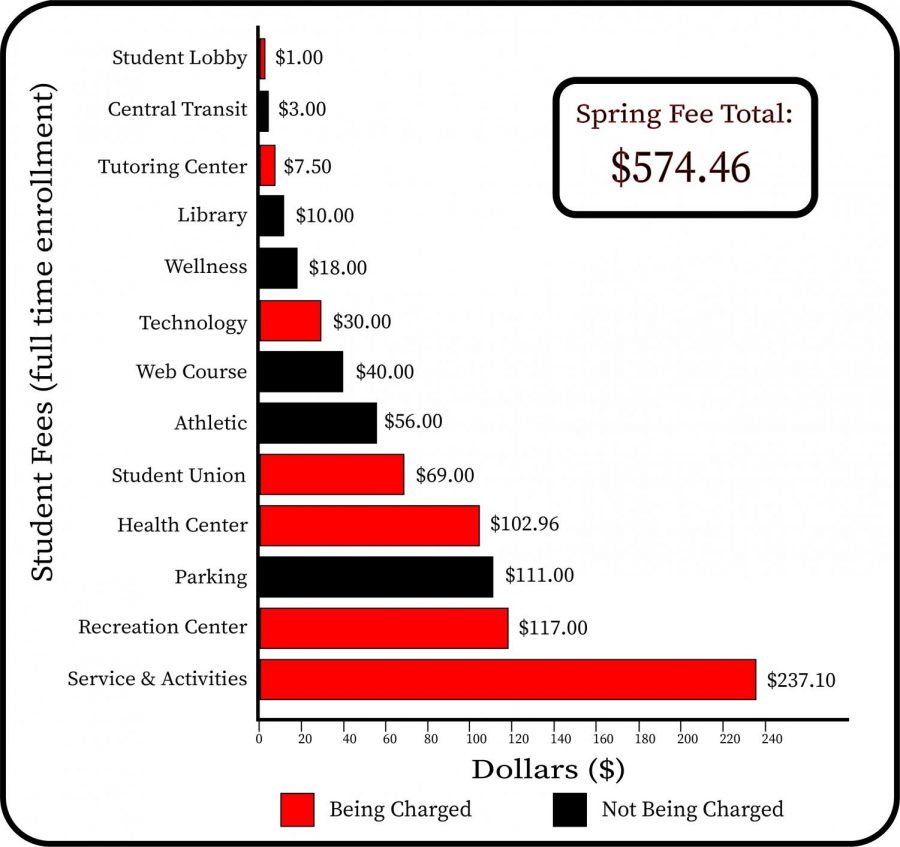Spring quarter fees announced
April 4, 2020
An email was sent to the student body from President James Gaudino detailing which fees the university would be waiving for the upcoming spring quarter. This information was sent out 11 days before the April 14 deadline for fees to be paid.
“We’ve been talking about fees for a long time … with the goal of minimizing the amount of fees to the greatest extent possible,” Chief Financial Officer and Vice President of Business and Financial Affairs and Board of Trustees Treasurer Joel Klucking said.
The email breaks down fees into categories of waived and continued.
Waived Fees
Fees that have been listed as waived are as follows:
The athletics fee, the Central Transit fee, the dining contract cancellation fee (for students who have purchased but won’t be able to use a meal plan), the housing contract cancellation fee (for students not residing in Ellensburg campus housing), the late payment fee, the late registration fee, the library fee, the parking fee, the online course fee and the wellness fee.
Continued Fees
Fees that will continue to be charged to students for spring quarter 2020 were broken into three categories as follows:
Student Services Fees
The Student Health and Counseling Center Fee supports important student services and will remain operational both in Ellensburg and in a web-based format.
Fees that Support Instruction
The Technology Fee will provide critical support for moving all instruction online.
Tuition Fees continue to be the same for online and in-person instruction.
Math and Writing Tutoring will continue online.
Fees linked to Contractual Obligations
The Student Union and Recreation Center Fees support bonds that were used to build the facility and cannot be waived.
The Service and Activities Fee supports bonds that were used to construct student mandated projects, as well as paying for direct student services and student programs.
Construction on some buildings, like the SURC, isn’t paid for up front according to Executive Vice President of ASCWU Alejandro Alcantar. It’s paid over time with bond payments. This is why there’s a legal obligation for CWU to still charge these fees.
Alcantar also addressed the distinction between voluntary and mandatory fees. He specified that voluntary fees are not voluntary in the most literal sense. It means they are not fees required by the state. The SURC fees are voluntary fees in this sense.
Students who may not be able to pay their fees can apply for a fee waiver from the Dean of Student Success’ office, which Alcantar says are evaluated on a case by case basis.
“I think they anticipated that a lot of students were going to request fee waivers, especially since they weren’t going to be on campus,” Alcantar said. “I think the university made the right choice in waiving a lot of the fees already.”
Klucking said waiving fees may put departments into difficult situations. For the athletic department, much of the money has already been spent on uniforms and equipment, and it could face a $400,000 deficit this year.
“When we charge a fee, it’s because we have a cost, and because we’re providing a service,” Klucking said. “And just because a student can’t participate … doesn’t mean we don’t have all the costs associated with that.”
Some fees were not addressed in the email, such as the grad fee. ASCWU President Jasmin Washington posted to Twitter on March 25, “Your grad fee is allocated to the processing, printing and mailing of your diploma, so this fee does not include commencement and is not refundable.”
Other costs that are not considered fees have also been waived. In an email from Dean of Student Success Gregg Heinselman and Executive Director for Housing and Residence Life Tricia Rabel, it was announced that housing and dining costs for spring quarter will be refunded for students who are not spending spring quarter on campus.

